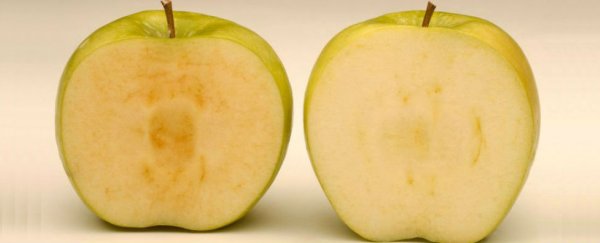The US government has approved the commercial planting of a new variety of genetically engineered (GM) apples that are resistant to going brown - either when cut or bruised.
Developed over almost two decades by Canada-based agriculture and biotechnology company, Okanagan Specialty Fruits, the so-called 'non-browning Arctic apples' were first planted in test orchards back in 2003 and 2005, and have been tested and refined over the past decade.
"Right now, to make fresh-cut apple slices and put them in the bag, 35 or 40 percent of the cost is the antioxidant treatment," the company's president, Neal Carter, told Dan Charles at NPR. The idea of these new GM apples, he says, is that food service companies will no longer have to treat their apples with preservative chemicals. "So you could make a fresh-cut apple slice 30 percent cheaper."
The new apples have been genetically altered to ensure that the production of an enzyme called polyphenol oxidase - which is responsible for the browning effect - is slowed down within the fibres of the fruit. The developers achieved this by adding copies of the gene that produces this enzyme into the apples, which sounds a little counterintuitive, but it works because the apples respond to the overproduction of the enzyme by shutting it all down.
Last November, the US government also approved the commercial sale of GM potatoes that have had their browning slowed down using a similar technique.
While the apples will still go brown and rot eventually, they'll do it at a much slower rate, and ideally, they would have already been eaten by then.
The US Department of Agriculture approved the apples - which will come in Granny Smith and Golden Delicious varieties - for commercial growing, based on two main criteria, as Lizzie Plaugic writes for The Verge. "During its assessment of the fruit, the USDA's Animal and Plant Health Inspection Service found Arctic apples posed little to no "plant pest risk" to animals or other agriculture," she writes. "It also determined the farming of the apples posed no significant risk to the environment. (Note: these U.S. Department of Agriculture pages are currently down for maintenance).
That said, their release will no doubt be mired in controversy, even if they avoid one of the most criticised aspects of genetic modification - inserting the genes of one type of organism into another. Carter told Andrew Pollack at The New York Times that the company had sought government approval back in 2010, and was met with tens of thousands of comments from the public over the perceived risks of GM food.
"A spokesman for the Agriculture Department said it took time to analyse the issues and all the comments received," Pollack reports. "There were two public comment periods that together drew more than 175,000 comments, the overwhelming majority opposed to approval."
On the other hand, Carter told Pollack that the apple had "a lot of silent supporters", particularly in the food service business. "I can't believe how many requests we've had just this morning to our website from people who want to buy trees," he said.
Because Okanagan Specialty Fruits is too small an operation to grow and distribute the Arctic apples on its own, they're planning to sell commercial licenses for a one-time fee of $1,500 per acre of trees, according to The Verge. Carter told The New York Times that he expects between 2,200 kg (5,000 pounds) and 4,500 kg (10,000 pounds) of the apples to be ready for the food service market by mid-2016, and stores - in very small quantities - the following year.
The question now is if the apples will have to be labelled as 'genetically modified' when they hit the market. Carter, understandably, would like to avoid this, but it will be up to the government to ultimately decide what's required of the company. "Okanagan is engaged in a voluntary consultation with the FDA regarding the safety of Arctic apples for consumption," Lizzie Plaugic reports for The Verge. "Although the FDA currently supports voluntary labelling of GMO foods, it's possible the agency could require Okanagan to disclose its fruits' genetically modified traits to consumers."
Sources: NPR, The Verge, The New York Times
